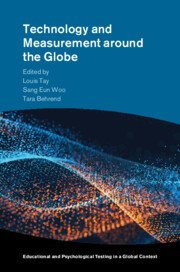Technology and Measurement around the Globe (2023)
Edited by Louis Tay, Sang Eun Woo, and Tara Behrend
There have been tremendous advancements in technology-based assessments in new modes of data collection and the use of artificial intelligence. Traditional assessment techniques in the fields of psychology, business, education, and health need to be reconsidered. Yet, while technology is pervasive, its spread is not consistent due to national differences in economics and culture. Given these trends, this book offers an integrative consolidation of how technology is changing the face of assessments across different regions of the world. There are three major book sections: in foundations, core issues of computational models, passively sensed data, and privacy concerns are discussed; in global perspectives, the book identifies ways technology has changed how we assess human attributes across the world, and finally, in regional focus, the book surveys how different regions around the world have adopted technology-based assessments for their unique cultural and societal context.
Handbook of Positive Psychology Assessment (2022)
Edited by Willibald Ruch, Arnold B. Bakker, Louis Tay, Fabian Gander
This volume gives a state-of-the-art overview of assessment in the field of positive psychology, including a comprehensive survey of current theories, approaches, issues, and assessment instruments. In four sections, leading experts look at different conceptualizations of well-being and discuss specific traits, states, and behaviors. New directions in positive psychology are also explored, including measuring primal world beliefs, imagination, self-transcendent experiences, and nostalgia.
Each chapter provides introductory background to the positive psychology topic being covered, reviews the most relevant assessment instruments, and discusses the specific assessment-related challenges. Recommendations for selecting assessment tools are included for specific settings, such as school, relationships, health and clinical settings, leisure, and interventions. This book is a must for positive psychology researchers, instructors, students, and practitioners wanting to select the right positive psychology instrument for the right situation.
The Oxford Handbook of the Positive Humanities (2022)
Edited by Louis Tay and James O. Pawelski
This handbook examines the new and rapidly growing field of the positive humanities--an area of academic research at the intersection of positive psychology and the arts and humanities. Written by leading experts across a wide range of academic disciplines, the volume begins with an overview of the science and culture of human flourishing, covering historical and current trends in this literature. Next, contributors consider the well-being benefits of engagement with the arts and humanities, marking out neurological, cognitive, emotional, behavioral, and social pathways to human flourishing. These pathways lead to detailed investigations of individual fields within the arts and humanities, including music, the visual arts, philosophy, history, literature, religion, theater, and film. Along the way, the book thoroughly synthesizes theory, research, and exemplary practice, concluding with thought-provoking discussions of avenues for public engagement and policy.
With its expansive coverage of both the field as a whole and specialized disciplinary and interdisciplinary drivers, The Oxford Handbook of the Positive Humanities advances the literature on the theory and science of well-being and extends the scope of the arts and humanities.
Big Data in Psychological Research (2020)
Edited by Sang Eun Woo, Louis Tay, and Robert W. Proctor
Technological advances have led to an abundance of widely available data on every aspect of life today. Psychologists today have more information than ever before on human cognition, emotion, attitudes, and behavior.
Big Data in Psychological Research addresses the opportunities and challenges that this data presents to psychological researchers. This edited collection provides an overview of theoretical approaches to the utility and purpose of big data, approaches to research design and analysis, collection methods, applications, limitations, best practice recommendations, and key issues related to privacy, security, and ethical concerns that are essential to understand for anyone working with big data.
The book also discusses potential future research directions aimed at improving the quality and interpretation of big data projects, as well as the training and evaluation of psychological science teams that conduct research using big data.
Handbook of Well-Being (2018)
Edited by Ed Diener, Shigehiro Oishi, and Louis Tay
This open-access textbook contains chapters that review the history, philosophy, and science of well-being.





